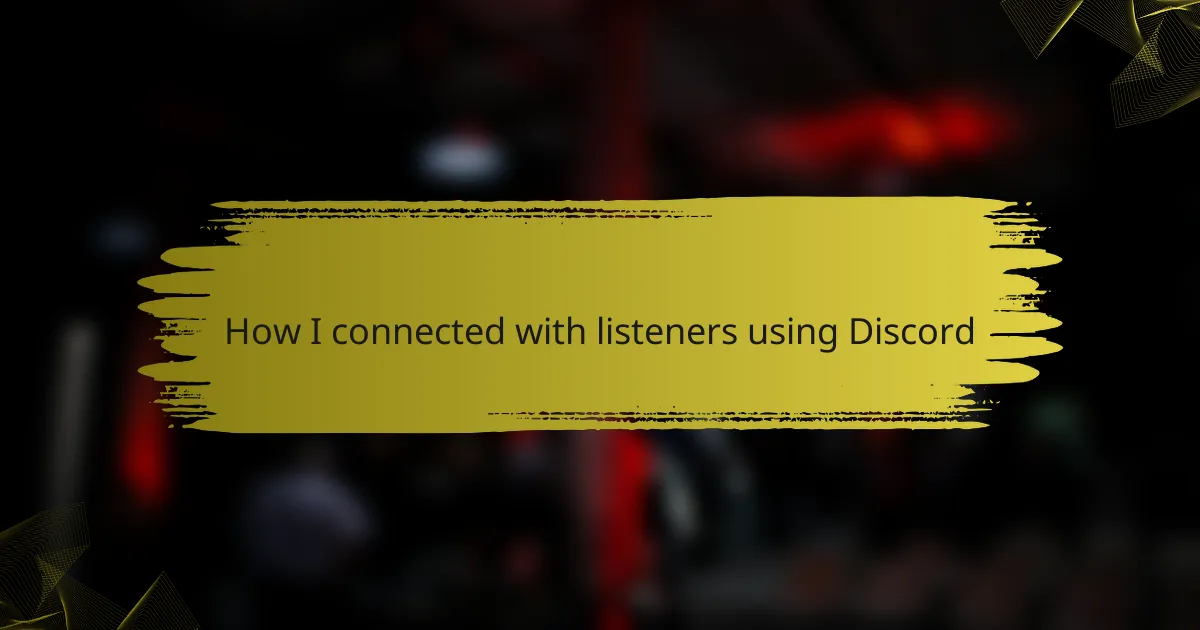Key takeaways
- Independent radio media promotes creativity, community, and diverse voices, creating deep connections through local culture and niche interests.
- Community engagement, particularly via platforms like Discord, transforms casual listeners into loyal fans, enhancing content through listener interaction.
- Discord features, such as voice and text channels, allow real-time discussions, fostering personalized and dynamic listener experiences.
- Regular community activities and showcasing listener contributions significantly strengthen host-listener relationships and build loyalty among audience members.
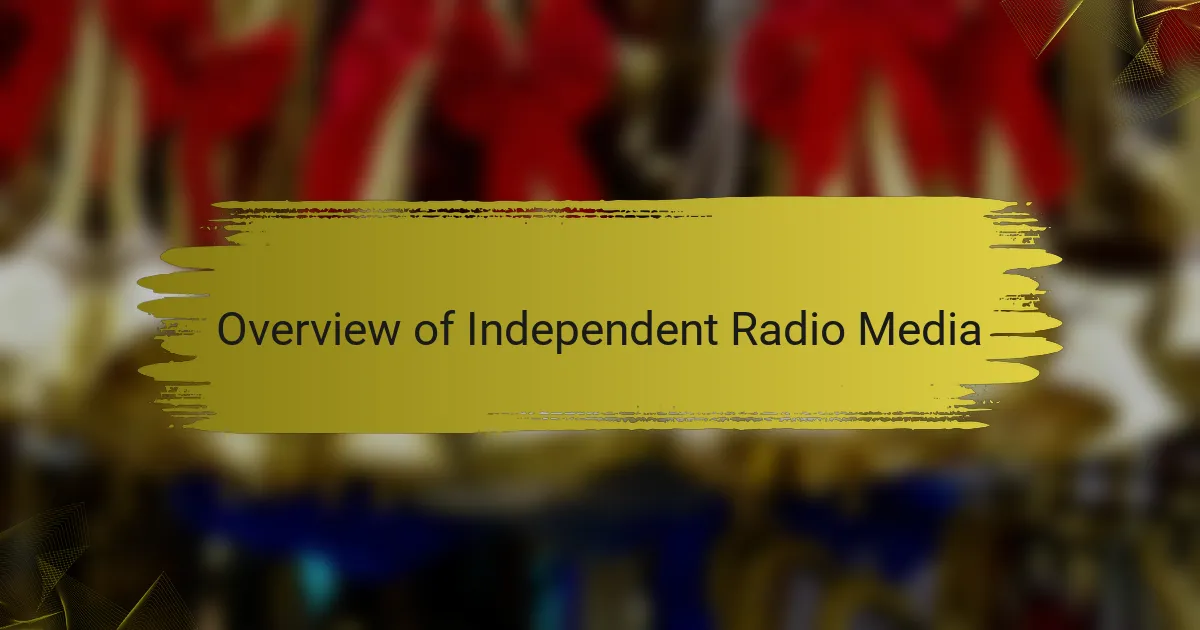
Overview of independent radio media
Independent radio media is an exciting space that thrives on creativity and community. It offers a platform for diverse voices that often go unheard in traditional broadcasting. I remember the first time I stumbled upon an independent station; it felt like discovering a hidden gem brimming with authentic stories and unique sounds.
One aspect that draws many to independent radio is its commitment to local culture and niche interests. Have you ever listened to a broadcast that spoke directly to your experiences? I have, and it created an instant connection, making me feel part of something bigger. These stations often prioritize listener engagement over commercial viability, fostering a sense of belonging among their audience.
Moreover, the rise of digital platforms has transformed independent radio, allowing creators to reach global audiences. I find it fascinating how a small, community-driven initiative can now connect with listeners from different continents. This accessibility enriches the content, blending cultures and perspectives in a way that larger networks simply can’t replicate.
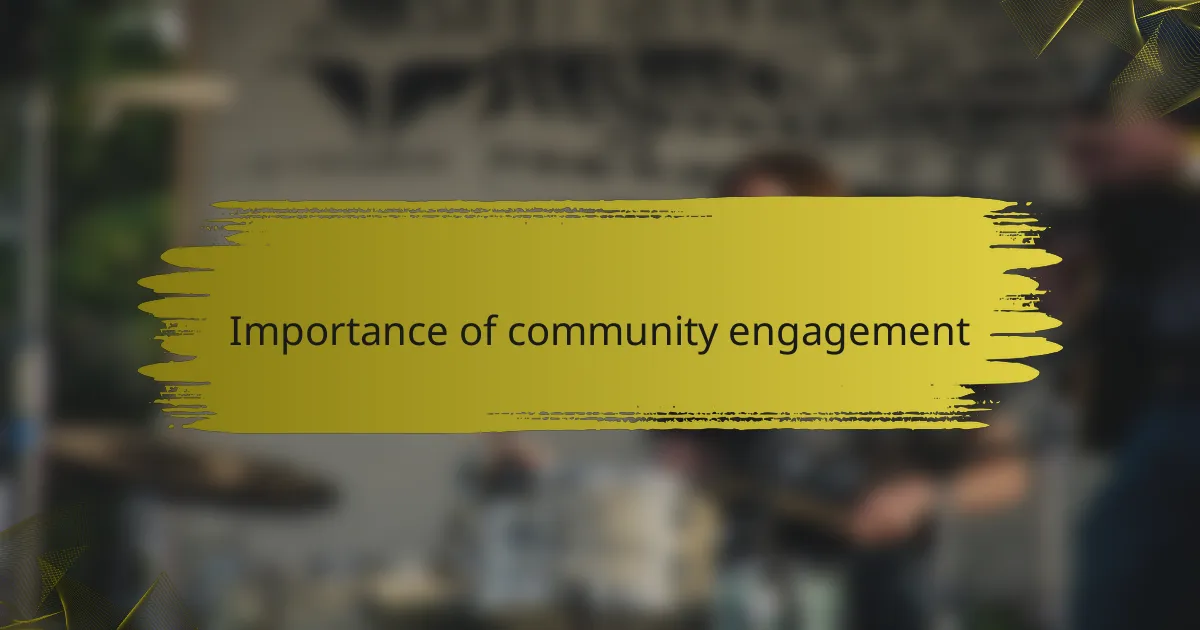
Importance of community engagement
Engaging with a community is vital for any independent radio media endeavor, and I learned this firsthand through my experiences on Discord. When I actively involved my listeners in discussions, their responses weren’t just feedback; they became part of a shared narrative. This connection fostered loyalty and turned casual listeners into dedicated fans who felt valued and heard.
Creating a space where everyone could share thoughts and ideas made it exciting to tune in each week. I remember one listener sharing how our show sparked her interest in local music, which in turn inspired me to dedicate a segment to emerging artists. These interactions brought a sense of purpose to my work, reinforcing the idea that community engagement isn’t just beneficial—it’s essential.
| Traditional Media | Community Engagement via Discord |
|---|---|
| Limited listener interaction | Real-time feedback and discussion |
| One-way communication | Two-way participatory dialogue |
| Generic content | Tailored content based on listener interests |
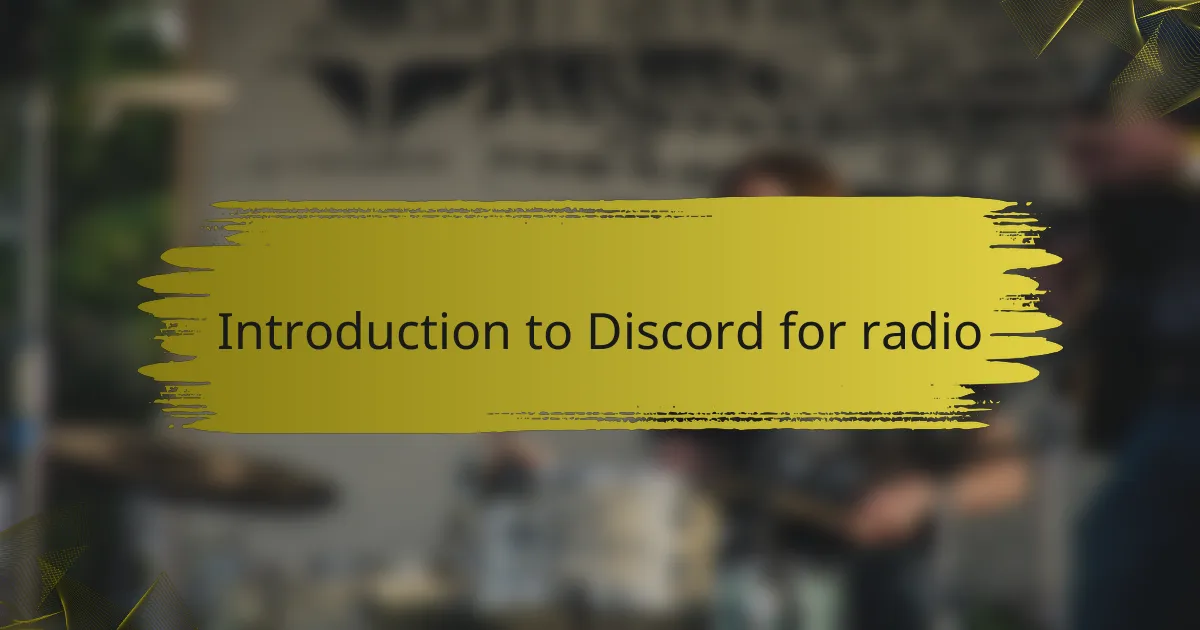
Introduction to Discord for radio
Discord has become more than just a platform for gamers; it has evolved into a vibrant community hub that connects people across various interests, including radio. My own experience with Discord began when I sought a way to foster deeper connections with my listeners. The moment I created my first server, I felt an immediate shift—listeners were no longer just passive voices; they had a space to share their thoughts, interact with each other, and even influence the content we produced together.
As I navigated this new landscape, I discovered features of Discord that really enhance engagement and community bonding. Here’s what I found particularly impactful:
- Voice Channels: These allow live discussions, giving listeners a chance to communicate in real-time.
- Text Channels: They serve as spaces for sharing show notes, playlists, and suggestions, turning listeners into active participants.
- Community Events: Hosting game nights or Q&A sessions helped me connect with the audience and understand their preferences more intimately.
- Polls and Feedback: These tools enabled listeners to voice their opinions on show topics, creating a more collaborative atmosphere.
Through these features, I realized how much richer the listener experience could be, transforming a one-way broadcast into an engaging dialogue.
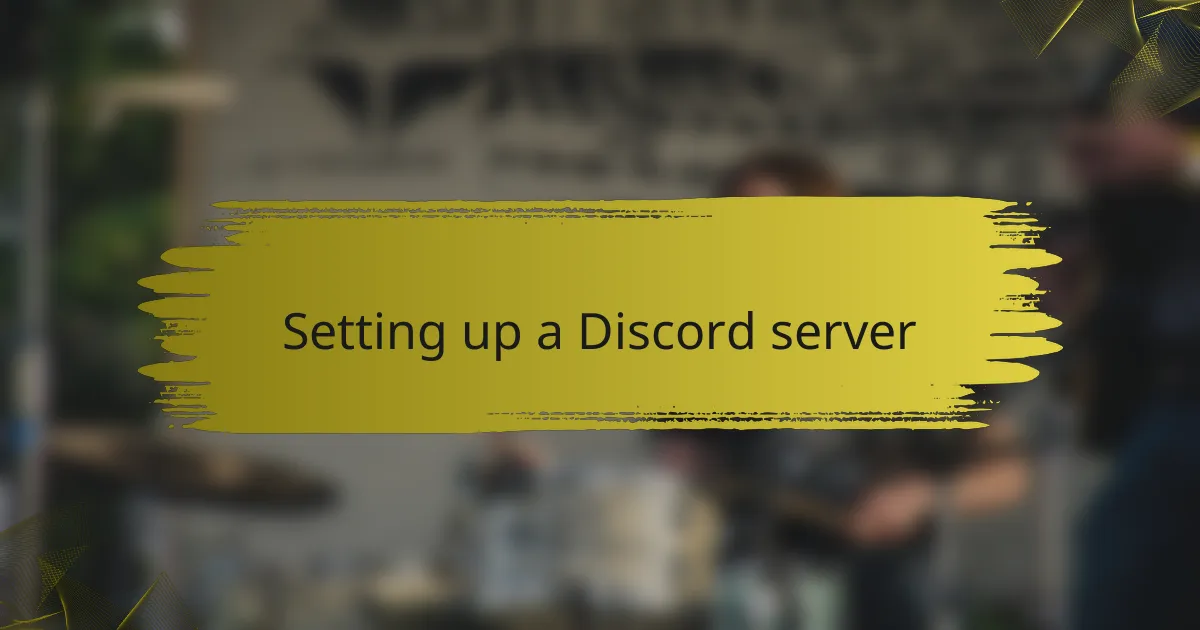
Setting up a Discord server
Setting up a Discord server is a straightforward process, but it requires some thought to create an inviting atmosphere for listeners. I remember when I first created my server; it was exhilarating to think I could foster a community around my radio show. The goal was to create a space where everyone felt comfortable sharing their thoughts and connecting with each other.
To get started, here’s a quick checklist to help you establish an engaging Discord server for your listeners:
- Choose a Server Name: Pick something relevant and catchy that reflects your radio show.
- Create Channels: Set up text and voice channels for different topics or discussions.
- Define Roles: Assign roles to listeners, moderators, and guest speakers to encourage participation.
- Set Rules: Establish clear guidelines to maintain a respectful and positive environment.
- Engagement Bots: Consider using bots for polls, music sharing, and welcoming new members.
- Invite Your Listeners: Share the server link through your broadcasts and social media, making it accessible to everyone.
Creating a balanced environment fosters deeper connections, and I found that the more my listeners interacted, the more my show evolved.
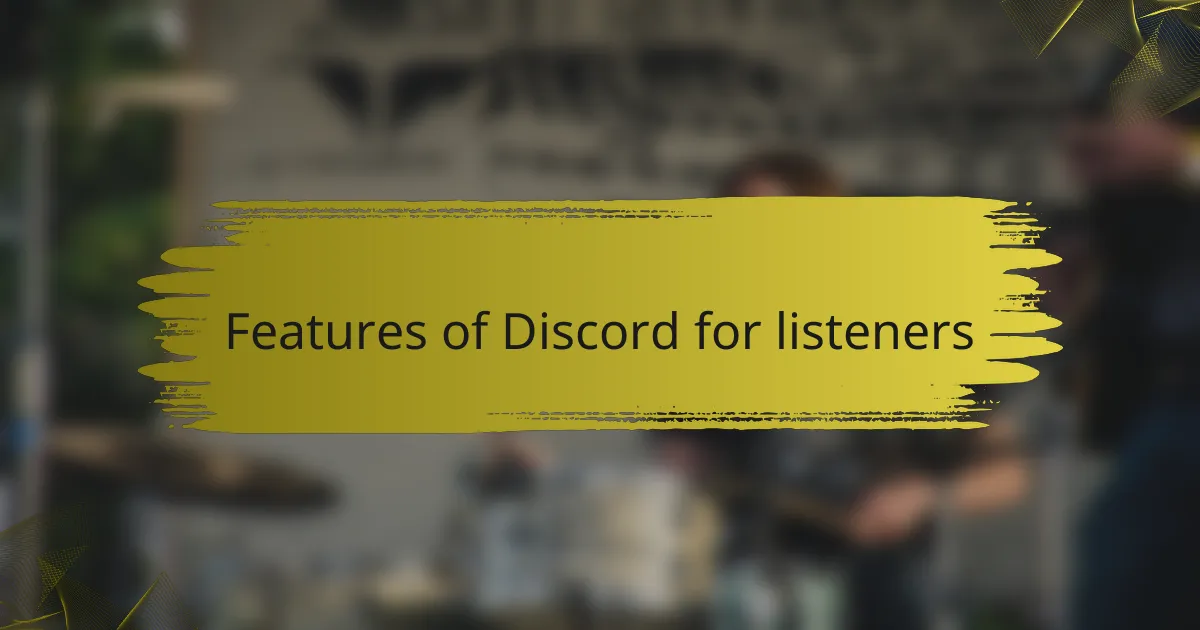
Features of Discord for listeners
Discord offers a range of features that enhance the listening experience for audiences. One of the standout aspects for me has been the ability to create dedicated channels for specific topics. This not only fosters targeted discussions but also allows listeners to engage in ways that feel personal and immediate. I love how my listeners can share their thoughts and feedback in real-time, making our connection feel less like a broadcast and more like a conversation among friends.
Another feature that I find invaluable is the voice chat function, which allows listeners to join live discussions. It’s gratifying to hear their voices in response to my content. This not only strengthens our community but also adds a layer of authenticity to the interactions. The ability to react to each other’s comments with emojis during live chats creates a vibrant, dynamic environment filled with shared excitement and emotions.
Here’s a comparison of some key Discord features that benefit listeners:
| Feature | Description |
|---|---|
| Text Channels | Allows for organized discussions on various topics. |
| Voice Chat | Enables live conversations, making interactions more personal. |
| Reactions | Listeners can respond instantly using emojis, enriching engagement. |
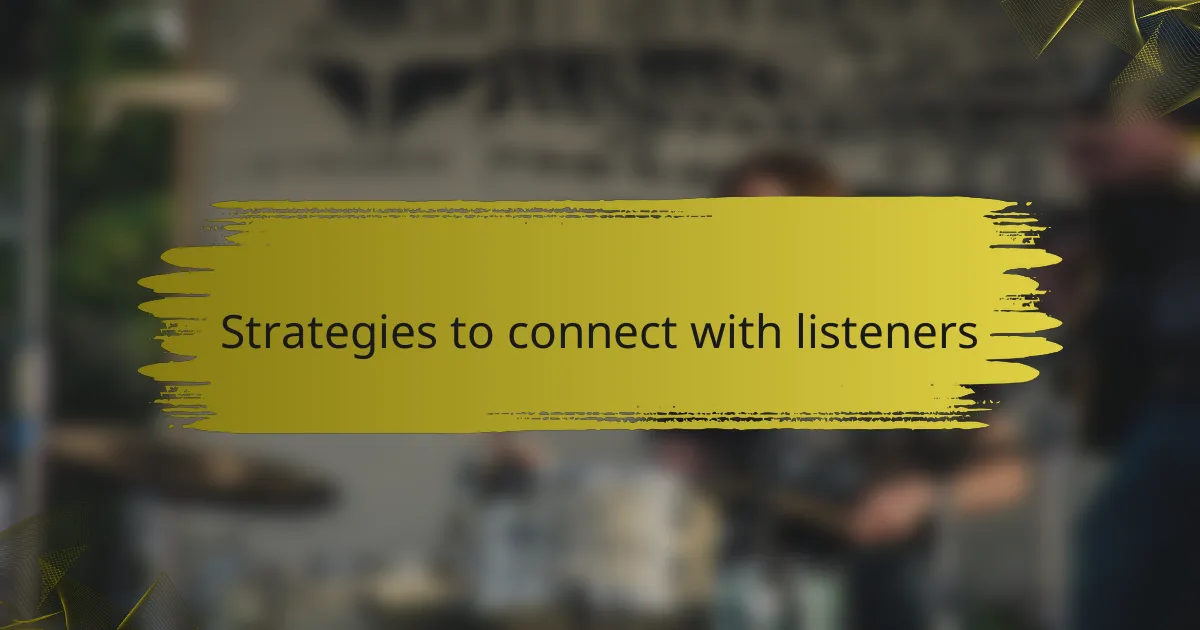
Strategies to connect with listeners
Engaging with listeners effectively requires adopting strategies that not only draw them in but also make them feel valued. I’ve discovered that actively soliciting feedback during live shows can create an electrifying atmosphere. It’s not just about what I want to share; it’s about what listeners are eager to hear. When I opened the floor to questions during a broadcast, the rush of excitement from their responses truly transformed the show into a collaborative experience.
Another impactful approach I’ve found is showcasing listener contributions. When I dedicated segments to listener-requested songs or stories, it fostered a sense of ownership among my audience. One time, a listener suggested a deep dive into a local band’s history, which ended up being one of our most cherished episodes. Have you ever felt the joy of seeing your ideas come to life? I believe that doing this not only strengthens the bond between hosts and listeners but also enriches the content we put out.
Finally, an essential strategy is developing regular community activities. I began hosting monthly themed events where listeners could participate in discussions, trivia, or even creative contests. These gatherings have transformed casual listeners into loyal community members who eagerly anticipate these opportunities for interaction. Each event reinforces our shared passion for radio, creating memories that resonate long after the sessions conclude.
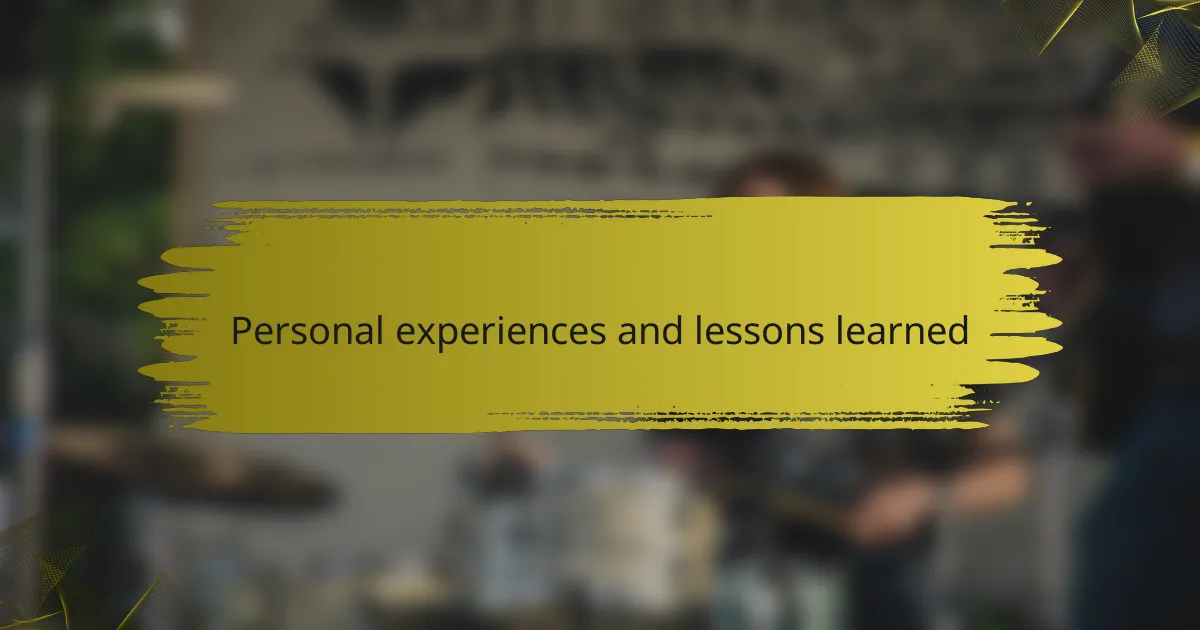
Personal experiences and lessons learned
Connecting with listeners on Discord has been a transformative experience for me. Initially, I was nervous about engaging in such a direct and informal space, but the warmth and enthusiasm of the community made it easier to build those connections. I remember hosting my first live Q&A session; the excitement in the chat was palpable, and it felt incredible to be able to respond to listeners’ questions in real-time.
Looking back, I’ve learned that authenticity is key. Sharing my personal stories and experiences created a level of trust that fostered deeper connections. I also realized the importance of active listening—when I took the time to acknowledge and respond thoughtfully to listener feedback, it strengthened our community bond even further.
| Experience | Lesson Learned |
|---|---|
| First Live Q&A Session | Real-time engagement fosters excitement |
| Sharing Personal Stories | Authenticity builds trust |
| Active Listening | Thoughtful responses deepen connections |
